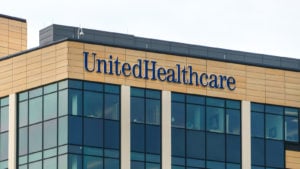Fund managers have a secret ingredient to deliver steady gains in client portfolios. UnitedHealth (NYSE:UNH) is the country’s dominant health insurance company. Over the last five years UNH stock has risen nearly 30% per year, its dividend rising from 50 cents to $1.25 per quarter. That’s about 50% better than the average Nasdaq stock.

A secret to its steady gain is pessimism. Headline writers are always afraid it’s about to fall out of bed. Commentary on its June quarter earnings, delivered July 15, was typical. Net earnings were $3.38 billion, $3.60 per share, on revenue of $60.6 billion.
Yes, UNH stock crushed expectations on earnings, journalists wrote. But guidance was low, revenues were short, the virus spells trouble, and the stock fell.
That sound you hear is opportunity knocking.
The Secret Sauce of UNH Stock
UNH’s secret sauce is technology.
The company’s Optum unit used the sweet, sweet cash of the Obama-era stimulus to integrate a suite of applications into its electronic health record. It bought a pharmacy benefit manager, now OptumRX, giving it visibility on drug costs. Optum has helped it move profitably into managed care, which is what “insurance” buyers really want.
Optum’s venture arm lets it get into new niches as they appear. In April, the company bought AbleTo, which does mental health services remotely, for $470 million. Optum’s venture arm had put money into the company just last year.
When trends emerge in the market, Optum matches them. Some 230,000 diabetic customers are getting Fitbits and glucose monitors to keep them out of the hospital. The “pilot program” will then be rolled out to self-insured customers.
That’s another part of UNH’s secret. For many big employers, health insurance isn’t insurance. Self-insured companies pay UnitedHealth to manage their programs. They pay UNH’s cost of care, plus a premium. Think of it as a general contractor for health. It’s one reason the company can steadily bring 5% of revenue to the net income line.
A Loud Downside
Yet most of the headlines you read about UNH are negative. You read about their getting sued for moving money around, or gouging patients on prices.
The fact is that UnitedHealth would prosper even in a Medicare for All scheme because it has the technology to manage it. Such a system would give OptumRX more control over drug prices, encourage it to buy or sign alliances with more facilities, and bring in millions of customers. The alternative would be to stand up a federal system all at once, a wildly expensive and complicated task.
Besides, managing Medicare and Medicaid contracts has become a profitable market niche. UNH is a big player in Medicare Advantage plans. AARP is practically a marketing arm of UnitedHealth.
The Bottom Line on UNH Stock
Numbers don’t lie.
UnitedHealth is a bargain stock and Wall Street professionals know it.
The company’s dividend of $1.25 per share looks small. The current yield is just 1.64%. But it grows steadily and it’s affordable. The price-earnings ratio remains a market-trailing 17. UnitedHealth entered the pandemic with $21 billion of cash on the books, and its cash flow from operations has doubled over the last five years.
A retirement fund manager who puts some UNH stock in her plan is giving employees a base on which to build. Holders are practically a who’s who of institutions and large mutual funds.
UNH stock isn’t a thoroughbred. It’s a good draft horse. It’s not flashy but it does the job. It’s liquid, so institutions can treat it like a bank. They can get in when things look tough, then get out when there’s something else they want to chase.
You can do the same with your retirement account.
Dana Blankenhorn has been a financial and technology journalist since 1978. He is the author of the environmental thriller Bridget O’Flynn and the Bear, available at the Amazon Kindle store. Write him at [email protected] or follow him on Twitter at @danablankenhorn. As of this writing he owned no shares in companies mentioned in this story.
